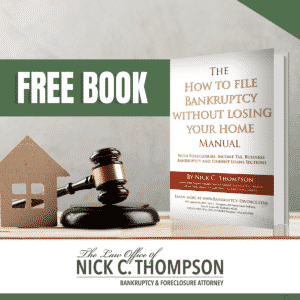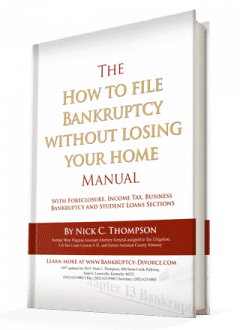By avoiding foreclosure with bankruptcy, you have the force of a federal judge behind you. Filing Chapter 7 only temporarily avoids foreclosure for about six months. However, Chapter 13 permanently stops the foreclosure process, cures the default, and allows you to keep the home. Furthermore, it is essential to file a Chapter 7 or Chapter 13 before the sale. Why?
- After the auction, you have no rights in the property. It no longer belongs to you. Even bankruptcy will not bring it back. You can redeem the property if you have thousands in the bank to pay the purchaser what he paid plus a small profit. But I have never met a single homeowner who had the money to do that.
- After the auction, you owe any deficiency and an income tax debt. Any home sold after 12-30-2012 requires the lender to file a 1099-C for any deficiency creating a tax debt. Filing bankruptcy before the sale eliminates having this tax debt.
- In Kentucky, at the moment the auction occurs, the lender obtains a judgment for the deficiency. Fannie Mae announced in 10-2010 that they would sue and attempt to collect any deficiency. Bankruptcy eliminates garnishment of wages and bank accounts for any deficiency.
You only have 20 days after you are served to file an answer or file bankruptcy. Otherwise, the court will typically issue a default judgment and sale. A Bankruptcy avoids losing possession of the home. But it must be filed before the commissioner’s sale.
Options to Avoid Foreclosure with Bankruptcy
⎆ Why file a Chapter 7 and then a Chapter 13 to stop foreclosure?
Chapter 7 eliminates the liability for most, if not all, of your unsecured debt. However, filing Chapter 13 after Chapter 7 means you don’t have to repay any of the unsecured debt you discharged in Chapter 7. This brings your Chapter 13 payments as low as they can be. In fact, filing Chapter 7 and then a 13 often makes saving the home affordable and possible.
Next, eliminating the unsecured debt in Chapter 7 first then eliminates paying unsecured debt later in Chapter 13. Finally, Chapter 13 is often filed after Chapter 7 to save the home with no unsecured debt to repay.
⎆ Avoiding foreclosure with Chapter 7.
Chapter 7 Bankruptcy only temporarily stops a home foreclosure sale. However, it protects the homeowner from any deficiency or tax debt if it is filed before the sale. In fact, there is no debt to “forgive” and no income from a “debt being written off.” Then, the homeowner has no legal liability, personal obligation, or responsibility for the debt after bankruptcy.
A Bankruptcy filed after the sale is often too late to reverse the tax. In defending the foreclosure, filing an answer, discovery, and submitting the bankruptcy will generally delay the foreclosure for an additional six months. In some cases, it delays the process for years. Therefore, sometimes just filing a Chapter 7 and eliminating unsecured debt makes your home affordable and avoids foreclosure.
⎆ Avoiding foreclosure with Chapter 13.
Catching up payments in Chapter 13 often permanently stops a foreclosure. You can take up to 5 years to cure your arrearage, but the payments must be on time. If your second mortgage is entirely unsecured, you can file a Chapter 13 and treat the mortgage as an unsecured debt and eliminate it in Chapter 13!
There are also mortgage programs that let you refinance to a lower interest rate. For instance, in 2017 this was below 5%. Interestingly, you can apply one year after your file Chapter 13. Plus, you can pursue a mortgage modification, ask for an accounting of mortgage charges, and file motions to contest improper claims in Chapter 13.
A Chapter 13 Bankruptcy certainly stops most foreclosures. But you have to make the payments on time in Chapter 13 and keep records to stop a foreclosure. For instance, if you file Chapter 13 to prevent a home mortgage foreclosure, keep a record of the payment history and proof that you are current with your post-petition mortgage loan payments.
Bankruptcy courts in Louisville, Kentucky, and Indiana require debtors to pay their ongoing mortgage payments directly to the mortgage lenders starting the day they file their Chapter 13. Debtors can only catch up and pay any arrearage to stop the foreclosure process through their Chapter 13 plans.
⎆ Motions for relief from stay.
Mortgage companies who are not paid on time file motions for relief from the stay. A motion for relief from stay requests permission to start the foreclosure again in state court. Mortgage companies also file motions for relief from stay if they are not provided proof of tax and insurance payments. However, if you keep records of the mortgage, property tax, and insurance payments, you have evidence. If you cannot produce copies of canceled checks or receipts for payments, the home will simply go back into foreclosure.
The bank may offer a probationary order, which allows you the ability to catch back up over six months. However, the bank has to pay a $300 dollar filing fee to file the motion for relief from stay. There is also about $750 to $1000 in additional attorney fees from such a motion. So, these attorney fees will be part of what the homeowner has to catch up.
I tell my clients to create a Chapter 13 file for records. This should include copies of payments, escrow payments, insurance payments, appraisals, pay stubs, and tax returns. You may not need these documents, but if you do, it saves the day. You have to take an active role in your Chapter 13 case. Be sure to educate yourself about the process. By avoiding foreclosure with bankruptcy you have the force of a federal court order behind you.
 Resources for Bankruptcy
Resources for Bankruptcy
Louisville Kentucky Bankruptcy Forms
How to Аvoid Louisville Kentucky Foreclosures • Video
Mortgage Foreclosures in Louisville Kentucky
Student Loan Income-Based Repayment (IBR)
Chapter 7 Bankruptcy in Louisville Kentucky
If you are thinking about facing foreclosure, don’t delay because timing is crucial. I am here to help you. So, contact my office right away to start the conversation. Nick C. Thompson, Bankruptcy Lawyer: 502-625-0905.

